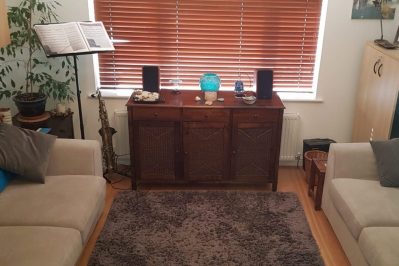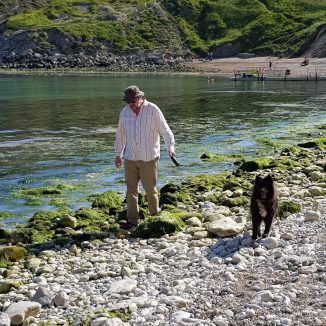Welcome to Paul Smith Therapy
A confidential space to explore the thoughts, feelings and challenges in your life
Psychotherapeutic Counselling for individuals in a safe, comfortable and private setting
Welcome, and thank you for visiting Paul Smith Therapy
My name is Paul Smith and I offer Psychotherapeutic counselling, providing both short and long-term therapy to adult individuals . I offer face to face sessions in Forest Row, East Sussex, or online, using Zoom.
We all experience times of difficulty in our lives, when events or relationships feel overwhelming, or we can feel a loss of direction or purpose. Talking to a trained professional helps us make sense of those challenging times and offers a way through them, moving towards a better understanding of ourselves and our feelings.

I work with people from all walks of life and backgrounds, coming to me with a diverse range of problems. I hold a UKATA Diploma in Transactional Analysis Psychotherapy. I am an accredited member of the BACP , and abide by their code of ethics.

Making the decision to see a therapist is a big step to take - but it can be a positive one. Please read on to find out more about how I could help you.
How can therapy help?
Life brings many challenges, and it is understandable that at times we might look for support in facing them. As a therapist my role is to provide space and guidance to help you on your journey of self-discovery; to enable you to examine your life and make new, meaningful choices within it.
I offer a chance to reflect on the difficulties or problems you are experiencing in a safe and confidential environment, with someone from outside your day-to-day life. Together we can explore your situation in a way that leads to fresh perspectives - and perhaps a new understanding of yourself. Therapy isn’t about giving you solutions or advice, but empowering you to make your own changes.
My approach to therapy is that it’s a process we go through
together. My role as a therapist is to support and guide you while exploring
your thoughts and feelings, allowing, and encouraging your authentic voice.
I offer both short term solution focused therapy and long
term therapy for Growth, Support, and Real Change
You don’t have to have it all figured out — and you don’t have to do it alone.
I'm a qualified and accredited counsellor offering a
supportive, confidential space where you can explore what’s going on, build
self-awareness, and move toward the changes you want in life. Whether you’re
feeling anxious, low, stuck, or navigating relationship challenges, we can work
together to make sense of it all — at your pace, and on your terms.
In our work together, I combine two evidence-based
approaches that complement each other well:
🔹 Transactional Analysis
(TA)
TA gives us a powerful framework for understanding how your past experiences
may still be influencing your present-day thoughts, feelings, and behaviours.
It helps us identify recurring patterns in how you relate to others and to
yourself. By becoming more aware of these patterns, you can begin to make
conscious choices that lead to healthier, more satisfying relationships and a
stronger sense of self.
🔹 Solution-Focused Brief
Therapy (SFBT)
While TA helps us understand the why, SFBT focuses on the how — how to move
forward, make positive changes, and build on what’s already working. It’s a
practical, forward-thinking model that draws on your existing strengths and
resources, helping you take small, meaningful steps toward the life you want.
Together, TA and SFBT create a balanced and empowering
approach. We explore and make sense of the deeper roots of your experience,
while also focusing on real, achievable progress in the here and now.

Speak in Confidence
Therapy takes place in a safe space, where you can meet with me as your therapist. I will listen with sensitivity and empathy, and without judgement. In the therapy space thoughts and feelings can be expressed freely and in confidence.

A problem shared...
Trouble with a relationship, anxiety, mood swings or depression? Many people face difficulties in their everyday lives that can be hard to get on top of. Therapy can help you to gain a better understanding of what’s causing these problems, and how you can move towards managing or resolving them.

Make better, healthier new choices
Working together can help gain greater insight into the difficulties you are facing, to understand why you act or react the way you do, and allows you to explore ways of making better, heathier choices to assist with moving forward.
What issues can therapy help with?
People come to me for help a wide range of issues. Here are a few of the more common difficulties that can be supported through counselling:
Feelings of stress or anxiety
Relationship problems
Grief, loss or bereavement
Problems with addiction
Trauma and post-traumatic stress
Abuse
Depression
Problems with confidence or self-esteem
Issues relating to sexuality
Difficulties at work or in retirement
Problems with family or college life
Bullying
The ability to actively listen to people and show understanding goes a long way in developing a healthy relationship with
someone. This ties in with being able to be open about your own thoughts, feelings and emotions. Through the exploration of one’s self, the ability to express feelings and speak your mind becomes easier and offers huge benefits in day to day living.
Better out than in, as the saying goes.
Through my journey in life, I now recognise the importance in allowing all my feelings, and allowing others theirs. Feelings alert
us to the fact that something is going on, which then allows us to explore our options.
The real danger arises when we do not allow ourselves and others to feel.
To feel is to live.

My location
I work in Forest Row, East Sussex and see clients face to face and also via Zoom, which allows me to see clients from any location which has an internet connection. I will provide location details when we arrange our sessions.
Feel free to contact me if you want to find out more about how online therapy works.
Fees & availability
Counselling sessions last for 50 minutes, usually taking place on a weekly basis, and cost £60 per session. I also provide a limited number of spaces for those on low-income or for students; contact me to enquire about availability.
Note that if you want to cancel an appointment I require 48 hours’ notice; otherwise you will still need to pay for any sessions missed.
I accept payment in cash, or by bank transfer.
Get in touch
Feel free to contact me if you have any questions about how therapy works, or to arrange an initial assessment appointment. This enables us to discuss the reasons you are thinking of coming to therapy, whether it could be helpful for you and whether I am the right therapist to help.
You can call me on 07960 888461 or you could send a message .
I am happy to discuss any queries or questions you may have prior to arranging an initial appointment.
All enquires are usually answered within 24 hours, and all contact is strictly confidential and uses secure phone and email services.
More about my approach & qualifications
Before becoming a therapist I worked as head chef, interacting with the general public and managing staff. Working environments tend to generate a lot of 'people problems' with customers and staff, so I became quite experienced at resolving conflicts and problems amongst my staff.
I have also spent many years as an improvisational musician, which allowed me to hone my listening skills, and enhance my ability to interact harmoniously with others.
After settling down and becoming a husband and step father, I signed up to do a course in psychotherapy.
This had been something close to my heart for some time, and which saw me on a road of personal discovery and emotional recovery.
I spent the next 4 years studying Transactional Analysis Psychotherapy to Masters level.
I then worked with West Kent Mind for several years before setting up in private practice. I am also an associate counsellor with West Kent Mind.

Transactional Analysis is a method of therapy where social transactions are analysed to determine the ego state of a person.
Developed by Eric Berne in the 1970’s his innovations showed us that changes in ego states are directly related to changes in behaviour. He pointed out that these changes are observable.
The ego states recognised in TA, are that of the Parent (Analytical), Adult (Dealing with the here and now), and Child (Intuitive and adaptive).
As a theory of personality, it helps us see how people are made up psychologically.
There are three main philosophies of TA;
People are OK
Everyone has the capacity to think
People decide their own destiny, and these decisions can be changed.

I am an accredited member of BACP, which means I have met their criteria for qualified and experienced therapists and work in accordance with their ethical framework.
It also means that you have access to their complaints procedure, for your safety and protection. In order to comply with BACP, I undergo at least 30 hours of professional development each year.
Frequently asked questions
Many therapists tend to view Counselling as ‘short-term’ work; when someone has a problem that can be looked at and discussed in a clearly-resolvable way. This work often requires undertaking sessions for a certain number of weeks, to explore, discover and clarify a way forward. Therapy is a word used more to describe ‘long-term’ work; discussion that tends towards substantial issues and things that might be life-changing on a deeper level.
Whether counselling or therapy work best as a short or long-term option depends on the client though, and the difficulties they are facing. In some cases counselling can prove helpful as a continuing, longer-term option, or therapy can help resolve an issue in just a few sessions.
There’s no fixed or ideal length of time for the counselling process; it varies from person to person and will often depend on the depth of the issues they are facing. While I can work on an open-ended basis with clients, I find it is helpful for us to both agree before we start on undertaking a certian nunebr of sessions and reviewing where we are at once we reach that point. You are able to decide how long your therapy willl last, and in return my aim is to make sure therapy continues for only as long as it is of benefit to you.
This depends on what your needs are. Some people find that after only a very few sessions they have some clarity and focus and are ready to end the therapy. Other people value the ongoing support and relationship with me and will continue to come for weeks, months, or even years. There is no 'one-size-fits-all' when it comes to therapy.
My aim is to offer you a first appointment, known as an assessment session within 1-2 weeks However, waiting times will vary according to pressure on our resources and your own availability.
Confidentiality is one of the main ways in which therapy differs from many other forms of helping - for example, talking to friends or family can rarely offer the same degree of confidentiality as talking to a therapist. Because of this confidentiality, you will find that, as you get used to coming for therapy , you are freer to talk about whatever you wish to.
No therapist can offer 100% confidentiality: there are some situations where the law requires disclosure of risk (e.g. certain child protection issues) and in common with most other therapists, there are some situations where I may not be able to keep total confidentiality. In particular, if someone tells me that they are thinking of harming themselves in a way that I believe puts them at serious risk, or if someone tells me that they are doing something that could put others at risk, I may not be able to keep such information confidential. However, breaking confidentiality is rare, and only happens after talking to the person concerned.
When you come for therapy it's important that you feel free to talk about whatever is important to you. Sometimes, you may not be clear what those issues are. Having a friend or family member with you is not usually helpful because they may have their own agenda for you. Even if this is just that they want to be supportive, or want you to 'get better', this agenda can prevent us opening issues up. When you come for therapy, you may need to explore thoughts or behaviours about which you feel ashamed or embarrassed and you may censor yourself so as not to hurt someone, or you may find that what they want you to talk about is not really what you need to discuss.
Sometimes, family/friends can even be part of an underlying issue which needs to be aired and discussed. Usually, people who ask this question are nervous about coming for a session alone, or they are anxious for the person who is thinking about arranging sessions. This anxiety is quite normal, and you will not be forced to talk about anything you feel uncomfortable about - but you do need to be able to talk about whatever is important. For this reason, I do not see clients accompanied by friends or family
You may not know it, but you’ve already taken the first step...
It can be scary and confusing making the decision to contact a counsellor or therapist, but in my experience people will struggle with a mental health issue, a personal crisis or problems with a relationship for much longer than is healthy. Sometimes a friend has proved a source of comfort, but this help can only go so far. Realising that resolving a problem requires something more means you have actually already taken the first step towards improving your life.
How I see it...
I have worked as a therapist for a number of years now, and have come to believe that unless someone wants to change and has the desire to ‘put in the yards’ and undertake the work, therapy will likely be of limited value. The skill of a therapist is in helping people to help themselves... the person coming to therapy has to want that help, and be prepared to act on it.
A fascinating journey begins here...
Seeing a therapist is not a passive act; it isn’t like visiting the doctor to be measured, assessed and treated. You don’t come away after one appointment with a pill to take and the responsibility ends there. Counselling and therapy are journeys with a guide through a familiar but somehow unusual land; they can be rewarding, sometimes confusing and often revelatory... what they aren’t is passive!
©2021 Paul Smith
powered by WebHealer